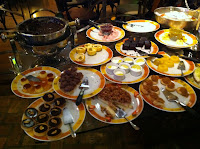 I'm back from Brazil now, and I have to say that Language Hacking really worked well for me. Kudos to Benny the Irish Polyglot. After two months of studying, I was able to have simple conversations and get complimented on how good my Portuguese was. In particular I was able to:
I'm back from Brazil now, and I have to say that Language Hacking really worked well for me. Kudos to Benny the Irish Polyglot. After two months of studying, I was able to have simple conversations and get complimented on how good my Portuguese was. In particular I was able to:- Order and pay at restaurants - including asking about an incorrect bill
- Buy baked goods and other items at grocery stores
- Ask for directions
- Check into a hotel
- Get help shopping for gifts
- Ask people about themselves and their families
- Ask to have my flight changed to the same itinerary as my wife's
- Joke around
 Brazilians make it very easy to practice Portuguese. They aren't uptight about the language and they love it if you smile and joke around. When I went into stores, very few people spoke English, which is really helpful. It avoids the situations where they feel the need to put you out of your language misery by speaking your native tongue. Instead, we would just smile and laugh while I used filler comments called connectors until I figured out another way to say what I wanted.
Brazilians make it very easy to practice Portuguese. They aren't uptight about the language and they love it if you smile and joke around. When I went into stores, very few people spoke English, which is really helpful. It avoids the situations where they feel the need to put you out of your language misery by speaking your native tongue. Instead, we would just smile and laugh while I used filler comments called connectors until I figured out another way to say what I wanted.
I was amused by the number of people who asked me if I used Rosetta Stone to learn Portuguese. They're definitely doing their marketing well - I even saw a kiosk in the airport.
Here are the learning techniques I used to prepare before the trip - mostly taken from Fluent in Three Months:
- Studied a Lonely Planet phrasebook for Brazilian Portuguese
- Found a co-worker who speaks Portuguese and had three conversation sessions with him
- Practiced greetings and pronunciations with a Brazilian vendor at the local farmers market
- Learned numbers, colors, food, phrases, and pronunciation from a language CD by Euro Talk Now
- Watched Brazilian movies from Netflix, first with English subtitles, then with Portuguese subtitles
- Used Anki Spaced Repetition Software (SRS) flashcard program and iPhone app to study connectors, phrasebook vocabulary, and finance-specific terms
- Wrote emails in Portuguese to co-workers in Brazil using Google Translate as a supplement
- Changed my iPhone, iTunes, and Facebook language settings to Portuguese
Once I arrived, I just kept in mind that I had to go out and speak in order to improve. And I had to replace the anxious look I get when I can't find the words or understand everything. Instead I focused on smiling, nodding, and using filler comments.
As an aside, some of my favorite words are "otimo" (o-chimo), meaning "great"; "legal" (lay-gow), meaning "cool", and "moleza" (mo-lay-zah), meaning "piece of cake". I also like that futebol (soccer) is pronounced "fu-tchy-bol" and PowerPoint is "powerpoin-tchy".
 I can't write about a trip without a section on food, so here goes. I had amazing pizza there (who knew there was such a huge Italian influence?). I ate delicious cuts of meat at the Fogo de Chao churrascaria (Brazilian barbecue). Every lunch buffet was full of deliciously savory sauces and spreads. We went to a great sushi restaurant (who knew there was such a huge Japanese influence?).
I can't write about a trip without a section on food, so here goes. I had amazing pizza there (who knew there was such a huge Italian influence?). I ate delicious cuts of meat at the Fogo de Chao churrascaria (Brazilian barbecue). Every lunch buffet was full of deliciously savory sauces and spreads. We went to a great sushi restaurant (who knew there was such a huge Japanese influence?).The draft beers ("choppe") were heavenly smooth - with Devassa's Negra as my favorite. But the best was the Pao de Queijo - cheese bread. Not just lower-case cheese bread. More like a glorious merger of light francese rolls and melted longhorn cheddar cheese at perfect nacho consistency so that it pulls away in a long string and falls all the way down past your chin when it finally snaps. Good thing I have a ten-year visa, because I may have to buy another ticket soon.
I thoroughly enjoyed learning Portuguese, but it was even more fun to learn so many tips to learn any language. I plan to shift my focus from Portuguese, which means it will join my ever-fading traveler's knowledge of Italian. We're traveling to Zambia in two months, so I'm going to apply all the techniques I just learned to my study of Bemba. I want to see if I can accelerate my learning pace. At the same time, I'm going to start brushing up on Spanish, with a goal of being conversational by next summer.
What language would you like to learn?
